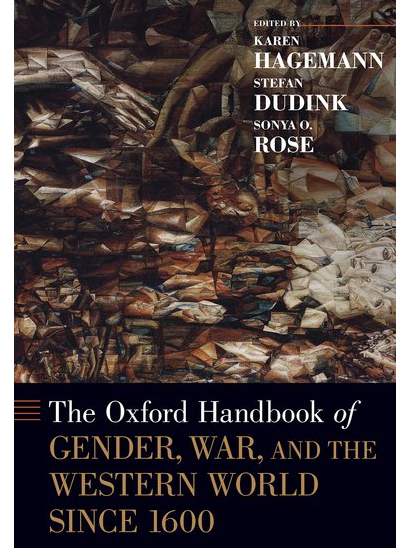 Faculty in the UNC History department have consistently produced scholarship that not only engages with timely issues, but can also offer new perspectives for understanding the historical developments of these issues in different contexts. A recent publication co-edited by professor Karen Hagemann, alongside Stefan Dudink and Sonya O. Rose, fits well within this tradition of innovative scholarship. Published in November 2020 by Oxford University Press, The Oxford Handbook of Gender, War and the Western World since 1600 is a collection of 32 essays which investigate the interplay of the social construction of gender and the shaping of warfare and military culture. The handbook features 28 distinguished scholars from 3 continents and 6 countries, who draw from the fields of gender and military history, and from the disciplines of cultural studies, political science and international relations.
Faculty in the UNC History department have consistently produced scholarship that not only engages with timely issues, but can also offer new perspectives for understanding the historical developments of these issues in different contexts. A recent publication co-edited by professor Karen Hagemann, alongside Stefan Dudink and Sonya O. Rose, fits well within this tradition of innovative scholarship. Published in November 2020 by Oxford University Press, The Oxford Handbook of Gender, War and the Western World since 1600 is a collection of 32 essays which investigate the interplay of the social construction of gender and the shaping of warfare and military culture. The handbook features 28 distinguished scholars from 3 continents and 6 countries, who draw from the fields of gender and military history, and from the disciplines of cultural studies, political science and international relations.
The publication of the Oxford Handbook was launched on March 5, 2021, in a virtual transatlantic roundtable on gender, war and citizenship, held also in memory of Sonya O. Rose, who passed away a few weeks before the book was published. The roundtable featured several of the handbook authors, who all discussed aspects of wartime politics of citizenship in various historical and geographical contexts. The roundtable convened members from the American Academy Berlin, the Netherlands Institute for Advanced Studies, and the center for Gender and Diversity Studies at the Radbound University Nijmegen. Along with the Department of History and the Curriculum in Peace, War and Defense at UNC-Chapel Hill, these four institutions generously sponsored the work on the handbook.
The Oxford Handbook marks an important contribution to a field that has disregarded gender and focused predominantly on men. Its innovative approach and structure also distinguish it from many works by scholars who have focused exclusively on women. “The handbook emphatically takes gender to refer to both men and women, along with the related constructions of femininity and masculinity. In doing so, it avoids the implicit assumption guiding much of the existing literature that only women’s relation to the military and war requires an explanation, a way of thinking that regards men’s place in the military and war as somehow self-evident and not in need of explanation,” Hagemann stated in the roundtable. This work then offers tremendous insight on how concepts of gender, war and violence need to be understood as relational and historicized appropriately and deliberately.
A second major strength of this volume is the wide temporal and geographical ground covered in the essays. Starting from the Thirty Years’ War and ending with post-Cold War era, the chapters of the handbook focus not on specific countries, but on historical processes which allow for comparative and temporal analyses of gender and war over time. The handbook moves beyond the conventional history-writing frameworks of nation states and the West. “The Western world,” Hagemann remarked, “is both a changing and contested construct and a historical phenomenon which was transformed through colonial and imperial expansion.” The handbook, therefore, critically engages with developments in colonial and global history as well.
The publication of the Oxford Handbook is supplemented by Gender & War Online, a digital humanities and public history project based at UNC-Chapel Hill. Gender & War Online offers extended bibliographies for all chapters, as well as nearly 9,000 annotated bibliographical entries with information on secondary literature, autobiographical accounts, primary source websites and films on the subject of gender and war. As of April 2021, the website has had more than 200,000 visits.
The symbiotic accompaniment of Gender & War to the Oxford Handbook marks another aspect of this work’s innovative approach. Taken together, these two resources seek to make the extensive research in the field of gender and war available to a broader audience, including teachers, students, and researchers. The integration of digital humanities in Professor Hagemann’s work reflects the broader commitment of the faculty in the UNC History department to making history accessible beyond the limits of the classroom.
